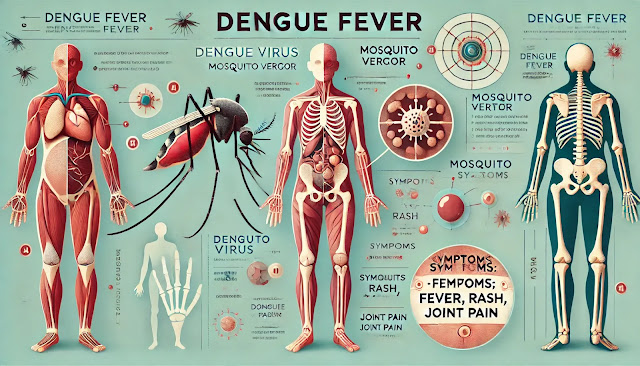Understanding Dengue Fever: Causes, Symptoms, Diagnosis, Treatment, and Prevention
1. Introduction to Dengue Fever
Dengue fever is a viral infection transmitted by mosquitoes, primarily Aedes aegypti. It is prevalent in tropical and subtropical regions and can cause flu-like symptoms. While many cases of dengue fever are mild, severe forms, such as dengue hemorrhagic fever (DHF) and dengue shock syndrome (DSS), can be life-threatening. Early diagnosis and proper management are essential to prevent complications. This blog will explore the causes, symptoms, diagnosis, treatment, and prevention of dengue fever.
2. Definition of Dengue Fever
Dengue fever is an acute viral infection caused by the dengue virus, which is transmitted to humans through the bite of an infected Aedes mosquito. The virus has four distinct but closely related serotypes (DEN-1, DEN-2, DEN-3, and DEN-4), meaning a person can be infected multiple times by different serotypes. Infected individuals can experience mild flu-like symptoms or develop severe complications, such as DHF or DSS, which require immediate medical attention.
3. Causes of Dengue Fever
Dengue fever is caused by the dengue virus, which is transmitted primarily by:
- Mosquito bites: The Aedes aegypti and Aedes albopictus mosquitoes are the main carriers of the virus. These mosquitoes thrive in tropical and subtropical climates and are most active during the day.
- Viral transmission: Once an individual is bitten by an infected mosquito, the virus enters the bloodstream and multiplies, causing a range of symptoms.
- Environmental factors: Dengue outbreaks are more common during rainy seasons, when stagnant water provides breeding grounds for mosquitoes.
4. Symptoms of Dengue Fever
Symptoms of dengue fever usually appear 4 to 10 days after being bitten by an infected mosquito and can range from mild to severe. Common symptoms include:
- Sudden high fever
- Severe headache
- Pain behind the eyes
- Joint and muscle pain (often referred to as "breakbone fever")
- Nausea and vomiting
- Fatigue and weakness
- Skin rash, which may appear a few days after the onset of fever
- Mild bleeding (such as nosebleeds or gum bleeding)
Severe cases can develop into dengue hemorrhagic fever or dengue shock syndrome, which may include:
- Severe abdominal pain
- Persistent vomiting
- Bleeding from the gums or nose
- Blood in the urine or stools
- Rapid breathing
- Cold or clammy skin
- Fatigue, restlessness, or confusion
5. Diagnosis of Dengue Fever
Dengue fever is diagnosed through a combination of clinical evaluation and laboratory tests:
- Clinical evaluation: Healthcare providers assess the patient’s symptoms, medical history, and recent travel to dengue-endemic areas.
- Laboratory tests: These include:
- Dengue NS1 antigen test: Detects the presence of the virus during the early stages of infection.
- Polymerase chain reaction (PCR) test: Identifies the viral genetic material.
- Antibody tests: Detect antibodies (IgM and IgG) produced by the body in response to the dengue virus, indicating current or past infection.
- Complete blood count (CBC): Can reveal low platelet counts, which is a common sign in severe cases.
6. Treatment of Dengue Fever
There is no specific antiviral treatment for dengue fever, but supportive care is essential. Treatment focuses on relieving symptoms and preventing complications:
- Pain relievers: Acetaminophen (paracetamol) is used to reduce fever and relieve pain. Avoid nonsteroidal anti-inflammatory drugs (NSAIDs) like aspirin or ibuprofen, as they can increase the risk of bleeding.
- Hydration: Drinking plenty of fluids or receiving intravenous (IV) fluids is crucial to prevent dehydration, especially in severe cases.
- Hospitalization: Patients with severe dengue may require hospitalization for close monitoring, fluid replacement, and blood transfusions in cases of severe bleeding or shock.
7. Prevention of Dengue Fever
Preventing dengue fever involves reducing mosquito exposure and controlling mosquito populations. Key preventive measures include:
- Eliminating mosquito breeding sites: Empty standing water from containers like flower pots, buckets, and tires where mosquitoes breed.
- Using insect repellent: Apply insect repellent containing DEET, picaridin, or oil of lemon eucalyptus to exposed skin.
- Wearing protective clothing: Wear long sleeves, long pants, and socks to reduce skin exposure, especially during peak mosquito activity times.
- Using mosquito nets: Sleep under mosquito nets, particularly in areas with a high risk of dengue.
- Vaccination: The dengue vaccine (Dengvaxia) is available in some countries for individuals aged 9 to 45 years who have had a prior dengue infection.
8. Medications for Dengue Fever
Since there is no specific antiviral medication for dengue fever, treatment focuses on managing symptoms:
- Acetaminophen: To reduce fever and relieve pain.
- Avoid NSAIDs: Medications such as aspirin, ibuprofen, and naproxen should be avoided as they can increase bleeding risk in dengue patients.
- IV fluids: For patients with severe symptoms, especially those suffering from dehydration or shock, IV fluid therapy is crucial for maintaining hydration and stabilizing the patient.
Conclusion
Dengue fever is a potentially serious viral infection spread by mosquitoes in tropical and subtropical regions. While there is no cure, early diagnosis, supportive care, and preventive measures can significantly reduce the risk of severe complications. This blog provides general information and should not replace professional medical advice. For accurate diagnosis and personalized treatment, consult a healthcare provider.




%20where%20a%20person%20stands%20with%20their%20knees%20touching%20while%20their%20feet%20remain%20apart,%20creating%20an%20'X'.png)
.%20The%20image%20should%20depict%20a%20human%20figure%20from%20.webp)



%20in%20a%20medical%20context.%20Show%20symptoms%20like%20constant%20throat%20clearing,%20cough,%20sore%20throat,.webp)
%20in%20a%20medical%20cont.webp)
Comments
Post a Comment